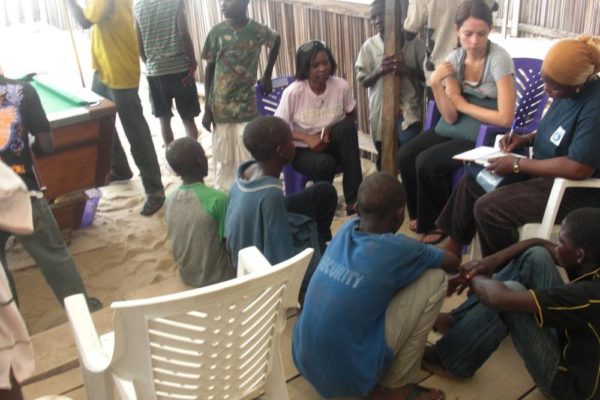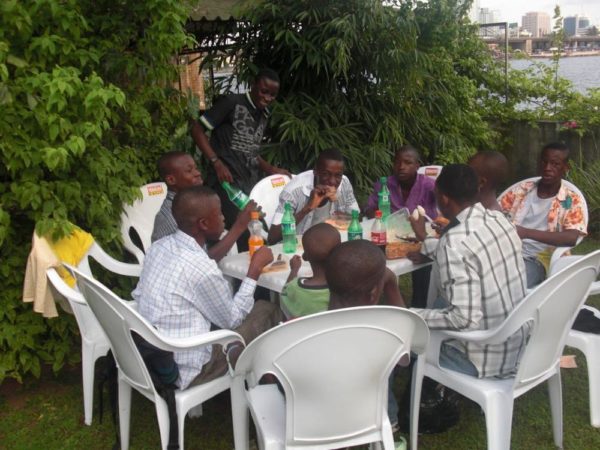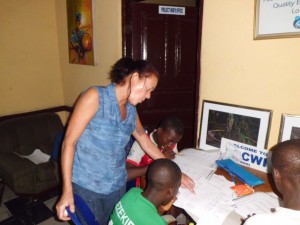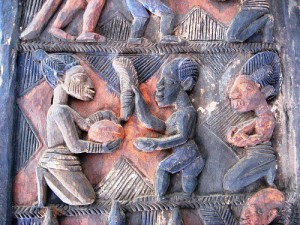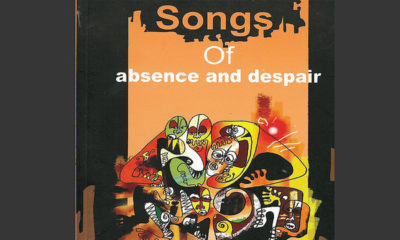News
Children’s Day Special: A Day’s Journey into the Lives of Lagos’ Street Children – Part 2
Here is the concluding part of the story:
SCCWI protects children from the hazards on the streets; they try to stabilise them. Alli says “the home has been able to calm them, physically and psychologically. If you are on the streets for just one week, it can change your entire life; think of a child that has been there for years? It is not going to be an immediate turnaround. You talk to them today; then talk to them tomorrow; you keep talking to them. Even when you are disappointed you keep doing it.” Alli says that she has had a series of disappointments; sometimes, some boys run away from the home. “Eventually we find them. We know the location of every boy that has left this home. Some of them want to come back but it is not everybody that is opportune to have second chances. We have given some second chances. They went they came back and we gave them second chances. Maybe when you ran away, you were 14 and that’s the highest we can take and then you are running back; you are 16, it will be hard to take you back. You are too old. You are running at 11 and you are 13 coming back. We try not to take older children so we are able to control them.”
Alli’s face beams as she comments on the change in her boys’ lives.”A lot of them have changed. I cannot compare them to when they came in. There has been a huge metamorphosis; it keeps me going. We now have children that are more stable, going to school though some are way older than their classes, but they want to get an education. The future is bright.”
She tells me that there is an interesting person that I need to meet. Mr Rafiu, the boys’ art teacher. Mr Rafiu is an inspirational story of how someone can grow through rubbles to success. Himself, a former street kid at Child Lifeline, a home where he was trained through his Art courses. Today, he gives back to other street kids. Today, he has two men who used to be homeless living with him. He also teaches them arts as a means to make a living.
Then, I meet two of the boys who live at SCCWI. To keep their identities, let’s call them Sunnex and TAD, their nicknames. Both boys have several things in common: they are both in their late teens; their mothers are both late; they both share a love for the arts and would love to become actors in the future; they both were rescued from Kuramo Beach.
TAD, son of a late never-around Marine Officer, narrates the cruelty he experienced at the hands of his step-mum; which included degrees of child abuse. “When you talk about maltreating, public disgrace, I was number one. She would hang me up on the fan; flog me. She would put pepper in my private part and armpits. She would tell me to be dancing; and singing my yansh is paining me. It was punishment upon punishment. My body was always peeling.” I wonder that if he endured all these, what was the breaking point for him; when and why did he decide to leave home “One day, I just decided. I went to a competition in Surulere; they said that they would give scholarship.” He reached the finals and needed money for passport photographs it was the finals. “Since we’ve been living together, I never touched her money. She would say ‘I know Thompson cannot touch my money’ but she will still accuse me.” There was a 500 Naira note on the TV. There was her purse on the table. I cannot touch her purse. I took the money from the TV. I told myself ‘Do passport N100 and return her change.’ Better, better what will happen is that she will beat me.” He told me, switching between pidgin and English language. On getting to the photo studio, he met another friend who could not afford the same passport. “But I now took the money. There was one of my friend in that situation and I did his own too. I knew I was going to suffer for it. She would tell me to count, how many N5 is in N200, that’s the beating I will take.” He shows me several marks from beatings on his arm “this is a natural tattoo.”
His step-mum went to his school and told the teachers what he did. Thompson was embarrassed “I calculated it; hanging; pepper; sometimes she will pour water on me in a drum for about ten minutes.” It was at that point that he took his sandals and left. He has not returned since then. His father is now late. He has not seen his step-mum since.
He calls his days on the streets his wandering days. “I wandered like a tourist. I can’t count the years of wandering before moving to Kuramo. There is no place in Lagos that I didn’t put my leg. For me, it was an adventure. There are so many things that happened to me, some I got used to it, like school. I started seeing what people on the streets are facing. You start motivating yourself. There is nowhere I didn’t sleep. Just find small shop; set the chair. I just had to get up in the morning. The owner of the shop won’t know. You carry your pako; and just go. Clean job! You may sleep somewhere for weeks and the owner of the shop won’t know. How will he know?” He questions.
Sunnex verifies TAD’s words. He came to Lagos from Ore, Ondo state. He started his life in Lagos in Oshodi; where he got swindled; did all sorts of odd jobs to make ends meet until he moved to Kuramo “My friends came and said “O boy there is beach there. There is a lot of water. And that was why I followed them. Because I’d not seen beach before. I want to see this beach that they are calling.”
They tell me of life in Kuramo; the good, the bad and the ugly. Sunnex says he preferred Kuramo to Oshodi. “I used to carry load. There is one thing they call bula, all these dustbins, those trucks. We will go there; carry food. Lots of food inside. Chicken, rice, etc. We will get to Kuramo and warm it. That was how we were living.” They also had to beg when things were hard, “You will beg for money from people. If they like, they will give you. Some will say “Kuro, o lo school. Ma lole iya e. Ki lo n wa. O feji bonnet mi ni?” Sunnex says in Yoruba. “You will go and meet some people, they won’t make up before o! Then, they will start to pretend as if they are making up; as if they are making call “Hello!” adds TAD. Both of them burst in laughter, remembering their Kuramo days.
There are people who do bad things in Kuramo. I want to know about those activities. They tell me, many people did such things because of survival “Many don’t feel like doing bad things but they get frustrated. People will come from outside to come and shaye, drink; they will get drunk and sleep off. Then boys will pick their pockets.” Kuramo is an organised community, with representatives who have individual responsibilities. “We build house there; lived normal lives just that there was no education. There are people who grow from being street kids; have their own children. There are generations on Kuramo. There are many of them who don’t wish to be like that. “TAD compares life in Kuramo to the Mumbai slums portrayed in the Indian movie Slumdog Millionaire. The story is just like what is happening in Kuramo. People come from all over, Ghana, Cote d’ivoire, Benin Republic, Sudan, and Gambia.” There are two boys in the home from Benin and Ghana. “Through difficulties, people from different tribes come together. The desire to survive brought people together. Everybody took themselves as one. “We have masters. If you smoke, you can be dealt with. It is just like Sodom and Gomorrah. They are not prostitutes, I don’t call them prostitutes. They are there to survive.” TAD says that he understands about five languages, he mentions three “I hear Ibira; I hear Igbo; I hear Kotos,” he says his ears learnt to pick them on the streets, trying to remember more.
Both boys agree that the home has made their lives better and given them reasons to hope for a better future. Sunnex is grateful for this. “When I came here, I could not speak English. I could not speak like this. When my mates were talking, I could not stand. Today, I can interact with them. Before, I will be thinking, se won o ni fun mi l’agbele bayi?” He said smiling. They are in SS3 in a private school and hope to advance to the university after their final exams. Thompson tells me that many parents do not care enough for their children, especially emotionally; he gets philosophical, “When you tell someone to sit down, are you sure that the person is comfortable? When you say carry that thing, are you sure that the person wants to carry the things? Many parents do not know what their children really want. They just force the children, even the rich, the poor.”
Maybe it is not all gloomy; Nigeria promulgated the Child Rights Act in 2003. I wonder what has become of the Child Rights Act that ought to protect children in our society. Many people think that it is a good law, in theory, but not in practice. Bitebo Gogo of Keep it Real Foundation says, “There is no protection for children who are not in conflict with the law. They don’t have a separate home for street children and children who are in conflict with the law. Both are mixed. Another aspect of it is the enforcement aspect. There is no proper enforcement. There are states that have still not ratified the law. If they don’t sign it.”
Tired, I make my way to the bus-stop on my way home. As I settled in the first row in the danfo, I notice two girls come in and go to the back of the bus; their trays of roasted groundnuts in tow. The younger one takes a seat in the boot. I leave my seat and join them at the back. I wanted to know why she was seating at the back. “We no sell today, so no money for transport,” she replied in pidgin. I tell her to come and sit on her sister’s lap; that I will pay. She is grateful. “Thank you Aunty,” she says as she hurries out. We have a chat. Her name is Hannah. She is 13. Her elder sister acts shy; kept throwing her face in the direction of the window. Hannah tells me that they walk from Ogba to Ikeja after school to sell groundnuts. “After school, at say 3: 30; we walk; we sell; we go back home.” Today, sales is not so good. I check my watch; it is 9:30pm as our bus careens out of Ikeja Underbridge into Oba Akran Road.
As I get home and start transcribing, there is only one question on my mind: what is the future of children if they are constantly abused, emotionally and psychologically? What is the future for a child whose parents cannot afford quality education? What is the future if our children are on the streets? That’s where it is, on the streets, flying with the winds like naira notes blown through a bus window; disappearing as fast as the slapping sound of a pair of slippers chasing a bus in traffic.
This Children’s Day is not time to just dance with the children at Aso Rock or give rousing speeches to a future that looks bleaker daily. It is time to demand that the Federal Government puts pressure on states that have not passed the Child Rights Act into law; it is a chance to do what we can to give a child hope for tomorrow. It does not have to be about millions; it may be as small as stocking the empty bookshelves at CSSWI with books; it may be a visit to the many homes that we have around. Whatever we choose to do, it is time to begin to think of the future today. If children are the future of tomorrow, we should start acting it today.


